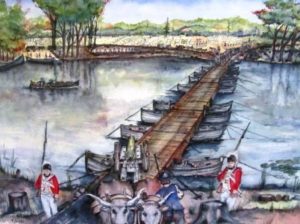Andebit et beaqui corendit, ut quostes esciendion re dit ad et prae parion es quia quas alibus sam, omnim faciden ducipidiat arum autem nobis enis es voat

26. Saratoga Falls Pocket Park: A Bridge of Boats
Burgoyne and his troops cross the Hudson River, gearing up for battle.
Listen to the Turning Point Trail Site 26 Audio Narration:

A natural bend in the Hudson River here creates a narrowing below the Saratoga Falls and the mouth of the Batten Kill, which has served as a river crossing since the last Ice Age. It was a well-worn Indian path by the time the first Europeans arrived. In 1709, the British constructed a military road to bring troops and supplies to the frontlines against their French adversaries during the early Wilderness War, and this is where Burgoyne and his army crossed the Hudson River in August 1777.
By crossing from the east to the west bank of the Hudson, Burgoyne and his troops would be able to march more easily south to Albany. On the west side, Burgoyne’s army would have access to the British-built military road. The terrain on the east side of the river was much hillier. The British had an enormous amount of equipment to carry and the river crossing was often flooded, so Burgoyne built a bridge of boats across the Hudson. Burgoyne’s troops lashed bateaux (oversized rowboats) side-by-side across the river and covered them with planks. They were anchored to both shores and provided a quick—if somewhat wobbly—bridge. Heavy rains caused the bridge to break apart, briefly dividing Burgoyne’s army on both sides of the river. Repairs were made, and Burgoyne’s men began their advance.
After the troops crossed, Burgoyne had the bridge dismantled, which meant that all communication with Canada was voluntarily cutoff. The supplies were floated downstream in bateaux to a large sheltered bay now called Coveville.
Travel Tools
Along New York State’s Historic Scenic Byway, Route 4, this site overlooks the Hudson River at the Saratoga Dam. Part of the larger Hudson Crossing Park, this is a great spot to watch birds or picnic. Hike the Hudson Crossing Park Sensory Trail to the Dix Bridge. It is believed that if you look up-river to the north, you can still see the cuts in the riverbank where Burgoyne’s men anchored the boats to the shore. Park on the left, at the pocket park, and listen to Track 26.
First-Hand Accounts
Baroness Riedesel was growing concerned about the fate of the campaign—specifically the lack of secrecy:
“But that which displeased me was, that the wives of all the officers belonging to the expedition, knew beforehand everything that was to happen; and this seemed the more singular to me, as I had observed, when in the armies of the Duke Ferdinand, during the Seven Years’ war, with how much secrecy everything was conducted. But here, on the contrary, the Americans were apprised beforehand of all our intentions; so that at every place where we came they already awaited us; a circumstance which hurt us exceedingly.”
–Baroness Riedesel


